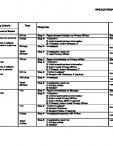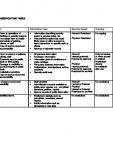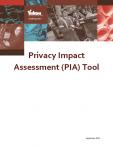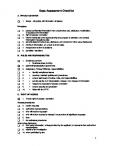Yukon Information and Privacy Commissioner
Presentations and Workshops
The Office of the Information and Privacy Commissioner (IPC) works to promote openness and accountability in public administration, in part through providing public education about access to information and protection of privacy rights in general and those set out in ATIPPA. Here you will find presentations and workshops that were hosted by the IPC to assist with learning about privacy rights.

Privacy Impact Assessment Workshop
A public body can effectively assess and manage privacy risks for any project involving personal information by conducting a privacy impact assessment (PIA). Completing a PIA enables a public body to identify any risks associated with the collection, use or disclosure or security of personal information and ensure the information is properly managed in compliance with the Access to Information and Protection of Privacy Act (ATIPPA).
In January 2015 the Information and Privacy Commissioner held a workshop to create awareness of the importance of conducting a PIA. The workshop is being provided to you here. Please read the instructions prior to beginning the workshop so you know how to effectively navigate through the workshop. If you have any questions pleae contact our office at 667-8468.
To obtain the most current Yukon Government PIA template contact Jeff Sunstrum, Yukon Government ATIPP Office, at 667-3510.
Privacy Management Program Workshop
Yukon public bodies can effectively manage their obligations under the Access to Information and Protection of Privacy Act by implementing a primacy management program.
In January 2015 the Information and Privacy Commissioner held a workshop about how to implement a privacy management program. The workshop is provided to you here. Please read the instructions prior to beginning the workshop so you know how to effectively navigate through the workshop. If you have any questions please contact our office at 667-8468.
Privacy Under ATIPPA Workshop
Understanding how to manage your work while complying with the Protection of Privacy requirements in the Access to Information and Protection of Privacy Act is important for all employees of the Yukon government and other public bodies subject to the Act. Whether these requirements are new to you or you need an update, this one-day workshop hosted by the Information and Privacy Commissioner on September 30, 2015 will help by focussing on the rules and standards set out in Part 3.
The day will begin with a brief overview of the history, key concepts, and organization of legislation and will then explore in detail the access processes and exceptions, the general rules for collection, use, disclosure, accuracy, retention and protection of personal information. The session will include engaging and interactive group work to allow application of the concepts and rules to exercises and scenarios.
The Office of the Information and Privacy Commissioner of British Columbia developed the following guidance material in conjunction with the Office of the Information and Privacy Commissioner of Alberta and Canada.
Click on the following respective links to view a printable version of the guidance material on Privacy Impact Assessments and Privacy Management Programs.
Privacy Policy and Program Development Workshop
The Information and Privacy Commissioner is hosting a one-day workshop on September 29 and October 1, 2015. This workshop will focus on the practical implementation of privacy compliance in the development of policy structure and initiatives for Yukon Government operating programs. The course will provide guidance on conducting a gaps assessment, and designing and integrating privacy elements effectively into the way the program does business based on its own functional needs.
Discussion will include, among other topics, the goals and components of policy development, privacy impact assessment, personal information identification and management, information flows, privacy breach response, and third party management. There will be an extended interactive component where you will be able to apply policy and program strategies to your own program areas.
The Office of the Information and Privacy Commissioner of British Columbia developed the following guidance material in conjunction with the Office of the Information and Privacy Commissioner of Alberta and Canada.
Click on the following respective links to view a printable version of the guidance material on Privacy Impact Assessments and Privacy Management Programs
Relevant FAQs
- Is the Information and Privacy Commissioner part of government?
No, the Information and Privacy Commissioner (IPC) is an independent officer of the Yukon Legislative Assembly and is, therefore, not part of the Yukon government.
In Yukon, the IPC is the same person as the Ombudsman and the Public Interest Disclosure Commissioner. Click on each role for more information.
The IPC is responsible for monitoring compliance with the Health Information Privacy and Management Act (HIPMA) and the Access to Information and Protection of Privacy Act (ATIPP).
ATIPP applies to Yukon public bodies, such as Yukon government departments. HIPMA applies to custodians (see ‘What is a custodian?’). For more information about HIPMA see the HIPMA FAQ section.
The IPC has a number of responsibilities under these Acts and has broad authority to investigate complaints made, including the power to compel production of records and witnesses. Under ATIPP and HIPMA, the IPC also has adjudicative authority which means her office can make findings of fact and law that are binding on public bodies and custodians subject to the Acts.
- When does the IPC hold an Adjudication under ATIPP?
Most complaints initially proceed to Informal Case Resolution (ICR) to try to settle the issues for review. Where a complaint is not completely settled during informal case resolution, a party can ask the IPC to conduct an adjudication. The IPC has discretion to decide whether to proceed to adjudication.
The IPC may initiate her own investigation, known as an own motion investigation, on a decision or matter that the commissioner reasonably believes could be the subject of a complaint.
- What happens in an adjudication?
An adjudication is the final stage in a complaint investigation and is a formal process conducted by the IPC. The parties to an adjudication are entitled to make representations to the IPC about the issues identified for adjudication. In most inquiries, the representations are made in writing and the parties do not appear before the IPC.
If the IPC decides to proceed to adjudication, a notice of adjudication is issued to the parties. The notice of adjudication outlines the next steps in the adjudication. The notice of adjudication will confirm:
- the parties to the adjudication,
- the sections of the ATIPP Act that will be considered,
- the issues for adjudication,
- the timeline for notifying the IPC of any preliminary objections to the adjudication,
- the schedule for delivery and exchange of initial and reply submissions from the parties, and
- a deadline for requesting the IPC’s approval for “in camera” submission material.
At the adjudication, the IPC considers the Fact Report prepared by the Investigation and Compliance Review Officer from the Informal Case Resolution (ICR) team, the representations received from the parties, reviews any records in dispute, and decides how each issue should be resolved and makes her recommendation(s) . The IPC issues a written report to the parties setting out her findings, recommendation(s) and reasons for the findings and recommendation(s).
Some of the things the IPC can recommend are:
- the release of some or all of the information in a record
- the modification of a fee waiver
- the correction of personal information










 @YukonOmbIpcPidc
@YukonOmbIpcPidc
 @yukonombipcpidc
@yukonombipcpidc
 Omb @yukonombudsman
Omb @yukonombudsman